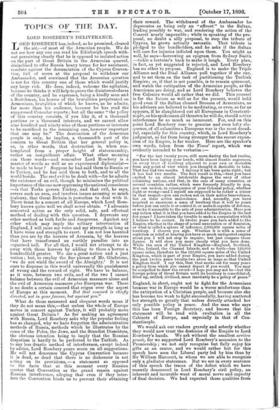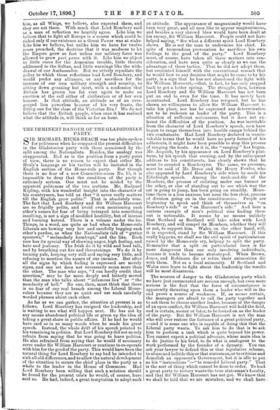TOPICS OF THE DAY.
LORD ROSEBERY'S DELIVERANCE.
TORD ROSEBERY has, indeed, as he promised, cleared 4 the air,—of most of the Armenian people. We do not see how any one can read. his Edinburgh speech with- out perceiving clearly that he is opposed to isolated action on the part of Great Britain in the Armenian quarrel, disinclined to offer Russia heavy terms for her assistance, resolute against the denunciation of the Cyprus Conven- tion, full of scorn at the proposal to withdraw our Ambassador, and convinced that the Armenian question is not for this country one of those which would justify any large risk. He does, indeed, welcome the agitation, because he thinks it will help to prove the disinterestedness of the country, and he expresses, being a kindly man and a Scotchman, his horror of the brutalities perpetrated on Armenians, brutalities of which he knows, as he admits, far more than his audience, because he has read the suppressed Consular reports ; but all the same "the policy of this country consists, if you like it, of a thousand portions or a thousand interests, and we cannot allow nine hundred and ninety-nine of these portions or interests to be sacrificed to the remaining one, however important that one may be." The destruction of the Armenian people is only, he implies' a thousandth part of the concern to Great Britain that her general policy is, or, in other words, that destruction is, when con- templated from a proper height of statesmanship, rather an insignificant affair. What other meaning can those words—and remember Lord Rosebery is a master of words as well as an experienced diplomatist— be made to bear ? Suppose he had said them to Russia or to Turkey, and he has said them to both, and to all the world beside. The real evil to be dealt with—for he admits the existence of an evil, though he minimises the political importance of the one now oppressing thenational conscience —is that Turks govern Turkey, and that evil, he says, covers such an area, and involves issues arousing so much jealousy, that Great Britain is powerless to deal with it. There must be a concert of all Europe, which Lord Rose- bery knows quite well we shall never obtain. "I advocate concerted action as the only solid, safe, and effectual method of dealing with this question. I deprecate any other method as both futile and dangerous. Against any other which may imply the solitary intervention of England, I will raise my voice and my strength as long as I have voice and strength to exert. I am not less haunted • than you are by the horrors of Armenia, by the horrors that have transformed an earthly paradise into an organised hell. For all that, I would not attempt to do away with those horrors by adding to them a horror a hundredfold greater. We are a great nation and a just nation ; but, to employ the fine phrase of Mr. Gladstone, 'we do not wield the sword of the Almighty.' It is not ours to dispense in this world universally the punishment of wrong and the reward of right. We have to balance, as it were, between two evils, and. of the two I cannot balance between the evil of Armenian massacre alone and the evil of Armenian massacre plus European war. There is no doubt a certain concord that reigns over the aspect of Europe at this moment. But that concord is chiefly directed, not in your favour, but against you."
What do those measured and eloquent words mean if they do not mean this,—that unless the whole of Europe moves in concert against Turkey, it will probably move against Great Britain ? As for making an agreement with Russia, Lord Rosebery asks why the popular feeling has so changed, why we have forgotten the administrative methods of Russia, methods which he illustrates by the cases of the Poles, the Jews, and the Stundist Dissenters, the obvious intention being to imply that the Russian despotism is hardly to be preferred to the Turkish. As to any less drastic method of interference, except indeed by advice, Lord Rosebery pours scorn on all suggestions. He will not denounce the Cyprus Convention because it is dead, so dead that there is no dishonour in not acting on its provisions, — a statement so opposed to the facts that at this moment every Russian quotes that Convention as the grand reason against Russian interference, alleging that even if they inter- fere the Convention binds us to prevent their obtaining their reward. The withdrawal of the Ambassador he, deprecates as being only an "affront" to the Sultan, leading possibly to 'war, and rendering the action of the Concert nearly impossible ; while in speaking of the pro- posal, no doubt a silly proposal, to stop the tribute of Cyprus, he grows actually sarcastic. That tribute is. pledgedto the bondholders, and he asks if the Sultan will care for injuries inflicted upon them. You might as well, he says—borrowing an epigram from Sydney Smith —tickle a tortoise's back to make it laugh. Every plan,. in fact, as yet suggested is rejected, and Lord Rosebery has no other to propose. England is to make the Triple Alliance and the Dual Alliance pull together if she can,. and to set them on the task of partitioning the Turkish. Empire; or, if that is not possible, is to remain quiescent, and watch the extirpation of the Armenian people, as the Americans are doing, and as Lord Rosebery believes the free Colonies would all rather that we did. This counsel is for the future as well as for the present, would hold good even if the Sultan cleaned Broussa of Armenians, as his advisers are believed to be meditating, or even, so far as- appears, if he slaughtered out all Europeans in Constanti- nople, as his spokesmen all threaten he will do, should active interference be so much as imminent. For, and on this point Lord Rosebery rose to genuine and even lofty elo- quence, of all calamities a European war is the most dread.. ful, especially for this country, which, in Lord Rosebery's. judgment, so far from being stronger for the recent expan- sion of its Empire, is far weaker. Here are the speaker's own words, taken from the Times' report, which was evidently intended to be verbatim :— "For the last twenty years, still more during the last twelve,. you have been laying your hands, with almost frantic eagerness, on every tract of territory adjacent to your own or desirable from any point of view which you thought it desirable to take. That has had two results. I daresay it has been quite right; but it has had two results. The first result is this,—that you have excited to an almost intolerable degree the envy of other colonising nations, and that, in the case of many countries, or several countries rather, which were formerly friendly to you you can reckon, in consequence of your Colonial policy, whether right or wrong—and I myself am supposed to be rather a sinner in that respect—you can reckon not on their active benevolence, but on their active malevolence. And, secondly, you have. acquired so enormous a mass of territory that it will be years before you can settle it or control it, or make it capable of defence, or make it amenable to the arts of your administration. Have you_ any notion what it is that you have added to the Empire in the last few years ? I have taken the trouble to make a computation which I believe to be correct. In twelve years you have added to the Empire, whether in the shape of actual annexation or of dominion, or what is called a sphere of influence, 2,600,000 square miles of territory. I observe you sigh. Whether it is with a sense of repletion or relief at hearing you have so much undigested empire about you I will not stop to inquire; but just compare these figures. It will show you more clearly what you have done. While the area of the United Kingdom—England, Scotland, Wales, Ireland, the Channel Islands, and E0 forth—has 120,000 square miles, therefore to the 120,000 square miles of the United Kingdom, which is part of your Empire, you have added during the past twelve years twenty-two areas as large as that United Kingdom itself. I say this, that that marks out for many years a policy from which you cannot depart if you would. You may be compelled to draw the sword—I hope you may not be—but the. foreign policy of Great Britain until its territory is consolidated, filled up, settled, civilised, must inevitably be a policy of peace."' England, in short, ought not to fight for the Armenians because war in Europe would be a worse misfortune than the extirpation of a Christian people, and because also she has become too weak to fight successfully, having scattered her strength so greatly that unless directly attacked her only possible policy is peace. And the man who says this has been Foreign Secretary, and knows that his statement will be. read with exultation in all the Cabinets of Europe, and especially in that of Con- stantinople.
We would ask our readers gravely and soberly whether they would now trust the destinies of the Empire to Lord Rosebery's hands. We ask without the smallest arrUre pense'e, for we supported Lord Rosebery's accession to the Premiership ; we not only recognise but fully enjoy his gifts as an orator, and we would rather but for this speech have seen the Liberal party led by him than by Sir William Harcourt, in whom we are able to recognise only a gladiator statesman. But we see in every sentence of this speech the traces of the defect which we have recently denounced in Lord Rosebery's civil policy, an inherent and incurable want of moral nerve and capacity of final decision. We had expected those qualities from him, as all Whigs, we believe, also expected them, and they are not there. With much that Lord Rosebery said as a mall of reflection we heartily agree. Like him we believe that to fight all Europe is a course which could be risked only if our existence as a Great Power was at stake. Like him we believe, but unlike him we have for twelve years preached, the doctrine that it was madness to let the Empire grow so fast unless our military force was allowed to grow pan i pas= with it. Like him we object to little cures for the Armenian trouble, little threats addressed to the Sultan, and little warnings like the with- drawal of our Ambassador. But we utterly repudiate the policy to which these reflections lead Lord Rosebery, and would prefer any alliances, or any sacrifices for the increase of our own military strength and security, to sitting down groaning but inert, with a confession that Britain has grown too fat ever again to make an exertion at the call either of civilisation or of her own honour. Is that attitude, an attitude as of an over- gorged lion powerless &cause of his very feasts, the fitting one for the close of the Victorian Era ? We do not believe that. the British people, when once it has realised what the attitude is, will think so for an hour.







































 Previous page
Previous page